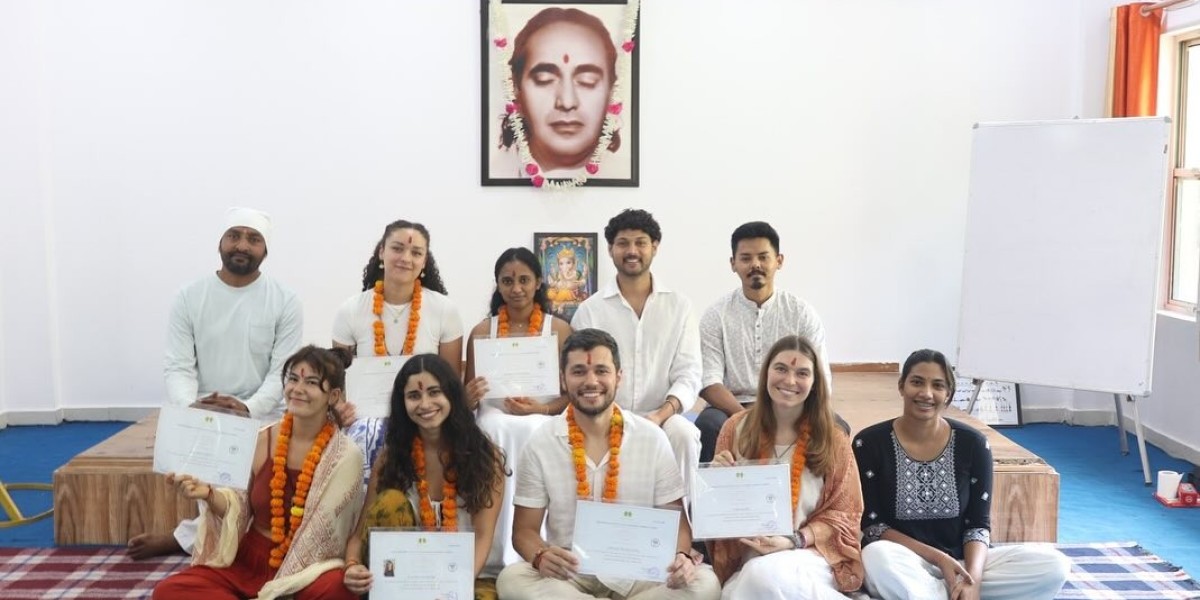In today’s fast-paced world, yoga has emerged not just as a path to physical fitness, but as a holistic practice for inner peace, balance, and transformation. As the demand for knowledgeable and compassionate yoga instructors continues to grow globally, more individuals are turning to yoga teacher training programs—not only to teach, but to deepen their personal understanding of the practice.
This article explores the essence of yoga teacher training in Rishikesh, offering insight into what the journey entails, what one can expect to learn, and how it can impact both personal growth and professional direction. Whether you’re considering becoming a certified instructor or simply seeking to immerse yourself in the deeper dimensions of yoga, understanding the structure and purpose of YTT is a powerful first step. This article focuses on several key points:
- What is a yoga teacher training,
- What location to be considered for the yoga teacher training, and
- How to choose the best yoga training.
What is a Yoga Teacher Training?
Yoga Teacher Training (YTT) is a structured program designed to educate and certify individuals to become qualified yoga instructors. It combines the physical, philosophical, and practical aspects of yoga to prepare participants to lead safe and effective yoga classes.
Key Components of a Yoga Teacher Training
1. Asana Practice (Physical Postures)
- Learning correct alignment, adjustments, modifications, and benefits of yoga poses.
2. Anatomy and Physiology
- Understanding how the human body works in relation to yoga movements and breathing.
3. Pranayama (Breathwork)
- Techniques to control and deepen the breath, and their effects on the nervous system and energy.
4. Meditation and Mindfulness
- Practice and theory behind concentration, awareness, and inner calm.
5. Yoga Philosophy
- Study of classical texts like the Yoga Sutras of Patanjali, Bhagavad Gita, and Hatha Yoga Pradipika.
6. Teaching Methodology
- How to structure a class, communicate effectively, use voice and presence, and manage a classroom.
7. Ethics and Lifestyle
- Understanding the yogic code of conduct (yamas and niyamas) and how to embody yogic values.
8. Practicum (Teaching Practice)
- Gaining hands-on experience by teaching peers or real students under supervision.
Certification Levels
- 200-Hour Yoga Teacher Training Course (YTTC) – Foundational level, most commonly offered worldwide.
- 300-Hour Yoga Teacher Training Course (YTTC) – Advanced training for those who’ve completed a 200-hour course.
- 500-Hour Yoga Teacher Training Course (YTTC) – Combined training or a continuation after 200-hour and 300-hour courses.
Accreditation
Many programs are registered with Yoga Alliance, a global organization that sets standards for teacher training. Graduates from such programs can become Registered Yoga Teachers (RYT).
Worldwide Top Locations for Yoga Teacher Training
Here are some of the best global locations for Yoga Teacher Training (YTT), each offering a unique blend of spiritual depth, natural beauty, and professional instruction:
1. Rishikesh, India
- Why it’s great: Birthplace of yoga, traditional teachings, ashram culture, Ganges River setting.
- Yoga styles: Hatha, Ashtanga, Kundalini, Iyengar
- Ideal for: Authentic, spiritual, and affordable training
2. Bali, Indonesia
- Why it’s great: Lush nature, wellness retreats, luxury and budget options, vibrant expat community.
- Yoga styles: Vinyasa, Hatha, Yin, Yoga Nidra
- Ideal for: Nature lovers and holistic lifestyle seekers
3. Thailand (Chiang Mai)
- Why it’s great: Tropical settings, affordable living, mindfulness traditions, massage integration
- Yoga styles: Hatha, Vinyasa, Tantra, Vinyasa Flow
- Ideal for: Fusion of Eastern practices with relaxation
4. Costa Rica
- Why it’s great: Eco-conscious culture, rainforest/beach vibes, retreat-style training
- Yoga styles: Vinyasa, Hatha, Restorative
- Ideal for: Adventure + yoga, surfing, and sustainability-minded students
5. Portugal
- Why it’s great: Western standards, ocean views, growing yoga culture in Algarve and Ericeira
- Yoga styles: Vinyasa, Hatha, Yin
- Ideal for: European students seeking international certifications closer to home
6. Mexico (Tulum, Sayulita, Puerto Escondido)
- Why it’s great: Bohemian vibe, beachside studios, holistic retreats
- Yoga styles: Vinyasa, Hatha, Shamanic & healing arts
- Ideal for: Spiritual growth in a modern setting
7. Greece
- Why it’s great: Island serenity, summer programs, beautiful landscapes
- Yoga styles: Hatha, Vinyasa, Yin, Restorative
- Ideal for: Summer yoga + cultural immersion
8. Nepal (Kathmandu, Pokhara)
- Why it’s great: Himalayan views, deep meditation culture, quieter than India
- Yoga styles: Classical Hatha, Meditation, Pranayama
- Ideal for: Serious practitioners interested in yoga's roots
Factors to Consider When Choosing a Location
- Style of yoga you want to study
- Accreditation (Yoga Alliance, etc.)
- Budget and travel logistics
- Language and cultural fit
- Lifestyle – quiet retreat vs vibrant town
Read More: https://www.zerohedge.com/user/StRMqKeAFZSnSTA3HwjGQLZtrv63
200 hour Yoga Teacher Training in Rishikesh | Best Yoga Teacher Training in Rishikesh | Yoga Teacher Training in Rishikesh



